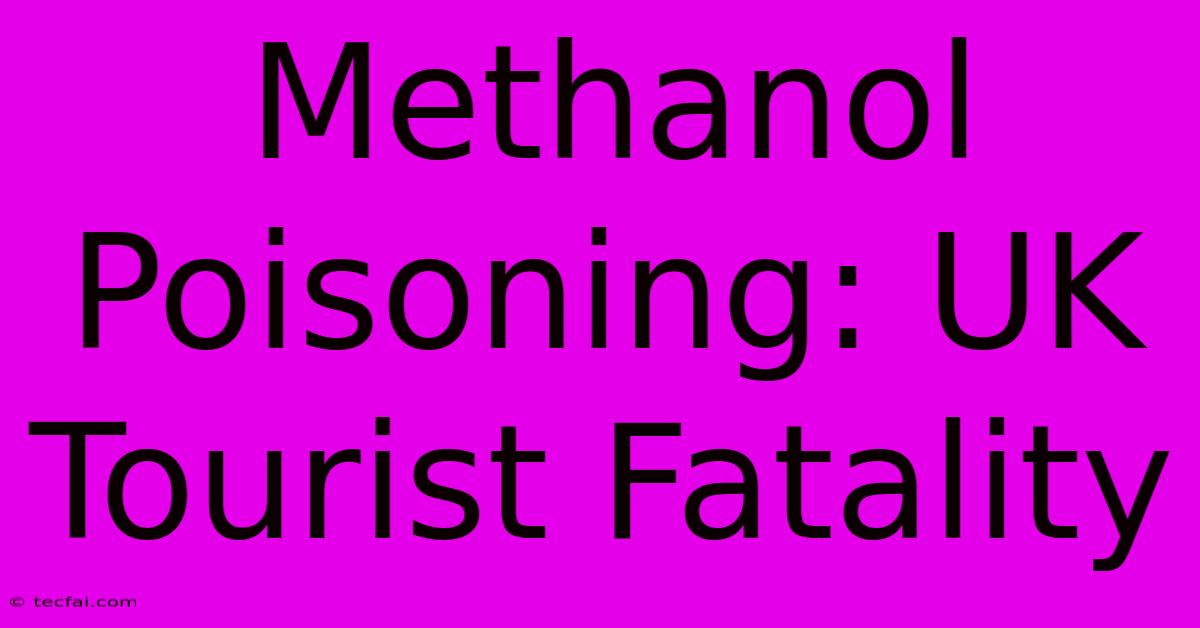Methanol Poisoning: UK Tourist Fatality

Discover more detailed and exciting information on our website. Click the link below to start your adventure: Visit Best Website tecfai.com. Don't miss out!
Table of Contents
Methanol Poisoning: UK Tourist Fatality Highlights Dangers of Unregulated Alcohol
The tragic death of a UK tourist from methanol poisoning underscores the severe risks associated with consuming unregulated or illicit alcohol, particularly while travelling abroad. This incident serves as a stark reminder of the importance of responsible alcohol consumption and the need for heightened awareness regarding the dangers of methanol contamination. This article will delve into the specifics of methanol poisoning, the dangers it presents, and how to mitigate the risk while travelling.
Understanding Methanol Poisoning
Methanol, also known as methyl alcohol or wood alcohol, is a highly toxic substance. Unlike ethanol (the type of alcohol found in alcoholic beverages), methanol is metabolized in the body into highly toxic compounds, formaldehyde and formic acid. These substances can cause severe damage to the eyes, nervous system, and other vital organs. Even small amounts of methanol ingestion can lead to serious health problems, and larger quantities can be fatal.
Symptoms of methanol poisoning can vary depending on the amount ingested and the individual's health. Early symptoms might include:
- Headache
- Nausea and vomiting
- Abdominal pain
- Blurred vision
- Dizziness
However, more severe symptoms can develop quickly, including:
- Blindness
- Respiratory failure
- Seizures
- Coma
- Death
The UK Tourist Fatality and its Implications
The recent death of the UK tourist, attributed to methanol poisoning, highlights the vulnerability of travellers to consuming contaminated alcohol, especially in regions with less stringent regulations on alcohol production and sale. Often, counterfeit or unregulated alcohol is sold at a lower price, making it tempting for budget-conscious travellers. However, this cost saving comes at an immense risk. The incident underscores the need for greater consumer awareness and stronger regulatory measures internationally to combat the sale of adulterated alcohol.
Protecting Yourself from Methanol Poisoning While Traveling
To minimize the risk of methanol poisoning while travelling, consider these crucial steps:
- Stick to reputable establishments: Choose well-known bars, restaurants, and hotels when consuming alcohol. These establishments are more likely to source their alcohol from reputable suppliers.
- Check the labels carefully: If you're purchasing alcohol from a shop, examine the label meticulously. Look for any signs of tampering or inconsistencies. Be wary of suspiciously low prices.
- Avoid drinking homemade or locally produced alcohol: Unless you are absolutely certain of its source and purity, avoid consuming homemade or locally produced alcohol, especially in areas with less stringent regulatory oversight.
- Be aware of your surroundings: Exercise caution when accepting drinks from strangers or unfamiliar sources.
- Drink responsibly: Even with regulated alcohol, excessive consumption can have severe consequences.
The Role of Government Regulation and Consumer Awareness
The tragic incident emphasizes the need for collaborative efforts between governments and consumers. Stronger regulations and enforcement on alcohol production and distribution are crucial to prevent the sale of contaminated products. Simultaneously, raising consumer awareness through public health campaigns and travel advisories is essential. Travellers must be educated about the risks of consuming unregulated alcohol and empowered to make informed decisions to protect their health and safety.
Conclusion: Prevention is Key
The death of the UK tourist serves as a powerful reminder of the life-threatening dangers of methanol poisoning. By being informed, exercising caution, and choosing reputable sources for alcohol, travellers can significantly reduce their risk. This unfortunate event necessitates a renewed focus on both robust government regulation and heightened consumer awareness to prevent similar tragedies in the future. The message is clear: prevention is key to staying safe while travelling and enjoying your trip responsibly.

Thank you for visiting our website wich cover about Methanol Poisoning: UK Tourist Fatality. We hope the information provided has been useful to you. Feel free to contact us if you have any questions or need further assistance. See you next time and dont miss to bookmark.
Featured Posts
-
Storm Bert Weather Warnings For Ni
Nov 22, 2024
-
Richard Coles Wealth Explored
Nov 22, 2024
-
British Tourist Death Methanol Case
Nov 22, 2024
-
Lord Prescott Obituary And Life
Nov 22, 2024
-
20 Years Of Dic Middle East Impact
Nov 22, 2024
